I was robbed at gunpoint last Friday at 1:45 in the afternoon. A young man appeared out of nowhere on a sunny tree-lined street on Potrero Hill and abruptly pointed a large semi-automatic pistol at my head as he instructed me and the man I was walking with to hand over our cameras, wallets, and phones. We complied. At first it’s difficult to believe that it is real, but after the first shock I quickly adjusted to the probable fact that my life was being threatened if I didn’t hand over my property. As it happens, I was subjected to repeated robberies and some extremely violent attacks as an adolescent in the early 1970s. I learned then that resistance led to worse violence, so my ingrained resignation to the situation served me well last week. After handing over our things following the robber’s methodical instructions, we were instructed to turn around and walk back down the hill, which we did. We were not shot, pistol-whipped, or even physically touched, so you might say we got off easy.
We turned the corner and found an open office a block later and from there called 911. Within minutes squad cars were careening around the nearby streets. The police took our description of the assailant and what he took and in ten minutes there were reports of an arrest in the public housing projects over the hill a few blocks away. Each of us was brought separately to “cold” identity the suspect. Where we had been confronted with a wiry, 20-something 5’10” African-American guy with a thin mustache clad in a gray hoodie, the cops were now holding a guy who was wearing plaid pants, a strange partial black elastic band around his otherwise bare torso, and hatless; he had disheveled hair and very pointy ears! I could not tell if it was the same guy. It might have been. But probably not… I already have a very mistrustful relationship with the police, knowing too much about their lawless handling of young men in the Mission over the past years (and the apparent cold-blooded murder at their hands of Alex Nieto on Bernal Heights last March). The officers I was with were professional and did nothing to offend me, but the whole scene of having other officers holding this guy 80 feet up the hill while I sat in the back of a squad car trying to see if he was the same person who robbed us was disturbing.
Adrenaline kept me going for a few hours as we walked back and my friend got in his car to drive home. I went to my house and began the tedious process of cancelling all my credit and debit cards and getting new ones issued, new cards for insurance, public transit, etc. Two hours later when I had finished my journey through voice-menu hell, I went off to buy a replacement phone. Whenever my mind was not on the immediate tasks at hand, I felt a growing anxiety deep in my chest. “Jangly” was the word one friend used to describe how I would feel for a while when I posted the experience in brief to Facebook. (I was surprised to receive over 100 messages of great compassion and warmth from friends near and far, which was an unexpected silver lining to this experience.) Here’s what I posted:
Well, had to pay the tax today. I was held up at gunpoint by a young man on Carolina Street between 23rd and 22nd, west side of street not far from the stairway connecting the two sides… he got my wallet with cash, credit/debit cards, driver license, an uncashed check, etc… and my camera and my cellphone… lost about $1,000 in total, and of course my insurance has a $1k deductible… so it’s my tax payment to a world of gross inequality I guess… the gentleman I was walking with, helping him with his book project, lost a much nicer camera/lens kit and all his wallet and phone too, so our robber did awfully well at our expense… a crime of opportunity indeed…
Mostly the comments have been expressions of sorrow and solidarity and compassion, but some people talked about how they may have reacted quite differently with combinations of rage and shame, especially after the fact. A couple of folks took issue with my lack of anger towards the assailant, wanting to refocus me and everyone else on the personal guilt of the individual that no “context” can exonerate.
Truth is, given the rapid polarization of wealth we’re living through, it’s more surprising to me how little of this armed expropriation is going on. I don’t forgive this man for pointing a gun at me. It’s unacceptable to threaten someone’s life over anything, let alone a few hundred bucks (that he got higher value was just his good luck and our bad). I’d like to believe that the gun was unloaded and that this was just good theater, but actually it was probably loaded, and this guy might well have shot me in the face if we’d reacted with anything other than the calm compliance we did. It’s deeply unsettling to think my life could have been snuffed out at that moment, and a point of real happiness that I got to have a great time speaking with dozens of friends on Saturday at the first Howard Zinn bookfair, and then spend Sunday with Adriana, going for a hot tub and massage, and generally relaxing, and trying to let go of the looping thoughts that are still jumping around in my head.

Here’s a great white heron taking flight over a former salt pond near Coyote Hills in the eastern South Bay. The rest of the photos in this post are shots I post to say “farewell” to the camera that was stolen, which had a nice zoom and captured some great shots while I had it…

Here’s a foreshortened view of Bernal Heights with Coyote Hills in the back right, 40 miles southeast.
Curiously, before the gun was in my face, I had been planning to write a blog entry for the past week about how angry and disgusted I am at living in a society that glorifies soldiers, war, violence, and the military, all while proclaiming itself a civilian democracy. Nothing gets more approval and enthusiasm at the grassroots in the United States than the military, quite an achievement considering that a generation ago the military had practically collapsed due to internal mutinies and external opposition. Nothing gets more people out of their homes and into movie theaters than the latest action blockbuster, which invariably involves enormous violence and mayhem, countless shootouts and car crashes, cartoonish villains and heroes. The number one sport in the U.S. is American football (in my opinion, the most boring sport of all) which overlaps in all aspects with military metaphors and concepts—the military liberally uses football metaphors for its own barbaric activities too.

Weird view of Potrero Hill in the foreground and the Oakland Coliseum in the distance in the East Bay.
Veteran’s Day just passed. As happens throughout the year—on Memorial Day at the end of May, on the 4th of July, and often during football, baseball, and other mass spectator sports events—we were deluged with a tidal wave of slogans and corporate advertising all “thanking our soldiers,” “honoring our heroes,” etc., ad nauseum. The Giants storied run to a 3rd World Series win in 5 years also unnecessarily linked itself to the U.S. military, both through advertising and gratuitous expressions of gratitude to the military and private mercenaries occupying Afghanistan and carrying out dirty wars in Iraq, Syria, Yemen, Somalia, and dozens of other locales around the world.
Every damn game has to start with the insipid National Anthem! Who remembers how that became a ritual to open every professional athletic contest? (Though the anthem first erupted during the 7th inning stretch of a 1918 World Series game, it was WWII and the emergence of PA systems that led team owners to prove their patriotic bona fides while the U.S. was at war by installing the anthem at the start of games. After WWII the Cold War brought its own frenzy of patriotic exhortations, now we’ve been stuck with it for decades.)
U.S. culture glorifies the military and violence in countless ways, so much so that we take it for granted and don’t even recognize the extent to which we emulate the military dictatorships we officially abhor. Even in the relatively military-skeptical Bay Area (we have managed at least to rid ourselves of a half dozen major military bases in the past quarter century), tens of thousands flock to see the Blue Angels and the warships that are rolled out every October for Fleet Week. Fleet Week itself had been abandoned in the wake of the Vietnam War, but was resuscitated by then Mayor Dianne Feinstein to help promote her plan to homeport the USS Missouri in San Francisco (a plan that was halted by the 1980s peace movement that rallied against it because the USS Missouri was to be reconfigured as a first-strike nuclear-tipped cruise missile carrier).

This is the Golden Gate Park soccer fields near Ocean Beach that are now being dug up and covered with astroturf after the frustrating passage of Prop I and defeat of Prop H in recent election… at least the pro-carmageddon Prop L was soundly defeated!
There is nothing heroic about becoming a soldier. Most of our “volunteer military” join out of economic desperation, or out of a delusion crafted by years of propaganda that suggests the U.S. military is a “force for good” as the current Navy slogan has it. Regardless of the status of the standing army (and navy, air force, marines, etc.) there is no mistaking the role of the military in the U.S. economy. Every part of the country gets some of the “action” when it comes to federal largesse, making sure that each politician has a stake in the ongoing expansion of the U.S. military budget (already more than then the next six or more countries’ military spending combined).
The actual nature of the US war culture, managed by the Orwellian labeled “Department of Defense” (before WWII it was more honestly called the Department of War), is understood by few people. We glorify the history we’re continuously spoon-fed about the “Greatest Generation” who won WWII, or about Lincoln and the Civil War, but the deep logic of total war as practiced by the U.S. is never understood historically. Amidst all the glorification of the US military is a bald-faced Big Lie that the US follows some kind of Code of War, that it behaves honorably, and that the “other guys” are the ones who do things that are beyond the bounds of civilized behavior. In actual fact, the United States has long practiced a style of Total War that was first developed on the frontiers of European colonies in North America, where women and children and residential towns are all valid targets, especially when the settlers were unable to defeat the powerful warriors of various tribes they confronted.
My friend Roxanne Dunbar-Ortiz just published An Indigenous Peoples’ History of the United States (Beacon Press: 2014) and in it she does a great job of detailing the evolving barbarism of the colonizer’s war against the original inhabitants of North America. Quoting John Grenier extensively (The First Way of War: American War Making on the Frontier 1607-1814. New York: Cambridge University Press, 2005) her book details how Total War emerged from the rapacious land-grabbing of the first colonists. After being given aid by the Pequots and other tribes of New England during their first winter or two when they might have perished, the Puritans eventually turned on their neighbors. Unable to win militarily against the allied warriors of the region, they instead attacked villages full of women and children, and burned local corn fields to destroy food supplies. Over the ensuing 200 years, the British settler society, using techniques honed first in Ireland when the first colonists were arriving in North America, used every dirty trick they could muster to demoralize and destroy the Indians who occupied the land they coveted. Scalping, a grisly ritual usually attributed to “savages,” was actually developed by white settlers when it was too unwieldy to carry full bodies back to get the bounty on “redskins.” (Football, anyone?) Scalps of dead Indians came to be sufficient to collect bounties, and the practice spread on across the country.
It would be one thing to dig up this history and present it as long passed and relatively disconnected from our lives today. But her project is to bring us face to face with the astounding fact that today’s U.S. government and its military continue to rely on the legal fictions and practical tactics that developed during centuries of total war against the indigenous populations of North America. I am not going to recount the false pretenses by which the war against Mexico was started in 1846, or how the US military deliberately provoked a conflict with the Filipino revolutionaries in Manila in 1898 to justify annexing that country (the Philippines did not gain formal independence until 1946!), or any of the dozens of flimsy pretexts by which the US sent troops into Central America, South America, the Caribbean, and Asia during the 20th century. The 2003 invasion of Iraq on false pretenses by the Bush/Cheney war criminals was just the latest in a long line of such activities. No doubt more will be offered up as reasons to send troops to Africa in the coming years (Ebola is just the camel’s nose). Here’s Dunbar-Ortiz’s account of recent legal arguments that depend on 19th century Indian War rationales:
In arguing that [Osama bin Laden’s media secretary Ali Hamza al] Bahlul’s conviction [(as an “enemy combatant”] be upheld, a Pentagon lawyer, navy captain Edward S. white, relied on a precedent from an 1818 tribunal. In his thirty-seven-page military commissions brief, Captain White wrote: “Not only was the Seminole belligerency unlawful, but, much like modern-day al Qaeda, the very way in which the Seminoles waged war against U.S. targets itself violate the customs and usages of war.” (p. 201)
The Center for Constitutional Rights skewered this absurd argument, noting its blatant racism as well as its bizarre claim that people who had long occupied northern Florida were somehow lawbreakers for defending themselves and their land from an invading force of US soldiers before it was even US territory!
Assistant U.S. Attorney General John C. Yoo’s infamous March 14, 2003 torture memos cited the 1865 Military Commissions and the 1873 The Modoc Indian Prisoners legal opinions in order to articulate the executive power in declaring the state of exception, particularly when the Modoc Indian Prisoners opinion explicitly marks the Indian combatant as homo sacer (in Roman law, a person banned from society, excluded from its legal protections but still subject to the sovereign’s power) to the United States.
So the convoluted and overtly racist justifications for the unforgivably barbaric US war on the original peoples of North America are the legal precedent used by likes of John Yoo to give Bush/Cheney their legal cover for openly torturing prisoners of war—even while denying them the status of prisoners of war! (And Obama gave them all a pass by refusing to proceed with the prosecutions that might have checked future executives from playing fast and loose with the law and morality—oops! Obama himself has been murdering people all over the world with drone strikes, even US citizens, sans any due process) Waterboarding was used extensively in the Philippines during the 1898-1903 US-Philippine War (mislabeled the “Spanish American War” when it’s mentioned at all in our horribly inadequate school books), and most of the scorched earth assaults on civilian populations were further developed there too, before finding a new use during the Vietnam War.
The so-called “heroes” we are supposed to “honor” for “keeping us safe” during all our holidays and sports events are not even remotely heroic, and why we would honor people who dutifully carry out the cruel agenda of the lunatics who run our country is beyond me.

Candlestick Park, soon to be demolished, and in the far distance both San Mateo and Dumbarton bridges, and San Jose 65 miles south.

Egets, Pelicans, Herons, and more… great bird watching at Don Edwards National Wildlife Refuge in the southeast Bay.

Industrial salt harvesting, owned by Cargill or Morton Salt, still going strong, but maybe not for long…
In light of this context though, it’s hardly surprising that in our daily lives we might be subject to arbitrary violence, even death. It’s so deeply stitched into the logic of US “civilization” that it would be harder to explain its absence than its presence. My own encounter with a gun in my face, while horrifying and unforgivable, is nevertheless pretty easy to explain in terms of how and why it could happen. How could it not, given the easy propensity we have for solving problems with violence and threats? Anyone can get a gun almost anywhere. Why wouldn’t someone living in the projects with an ever-shrinking prospect of bettering his life through any of the approved methods (school, work, etc.) at some point just give up and realize that he’s living in inescapable poverty while surrounded by increasing numbers of wealthy people who are increasingly walking around without a care in the world? How many people really think it’s not a rational response to get a gun and go out and help yourself directly to some of that wealth?
Given the kleptocratic state we’re living in, that slaps bankers on the wrist with a ‘tsk, tsk’ and gives them free money to re-game the same pyramid of debt that nearly collapsed in 2008, by what moral logic do we condemn the armed robber? He’s doing what everyone is doing, albeit with a considerably higher risk of hurting someone directly, as well as getting caught—and all for a lot less potential gain. We’re all trapped in this insane society, watching criminals on high getting away with mass murder and untold riches on a daily basis while most of us just get by as best we can. For those who have no options, we can hardly be surprised when they appear out of the bushes and put a gun in our faces. I’m more surprised that it doesn’t happen a lot more often than it does.

Bison in Golden Gate Park… turns out the herd there was crucial to restocking the wild herds now slowly expanding in the plains again…









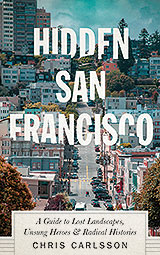
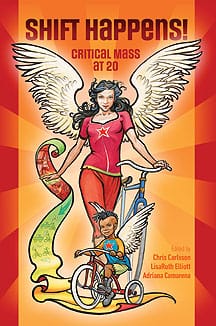
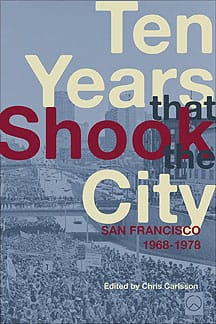

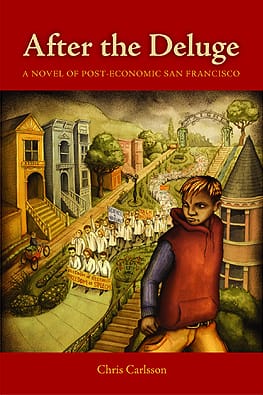
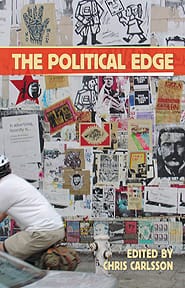
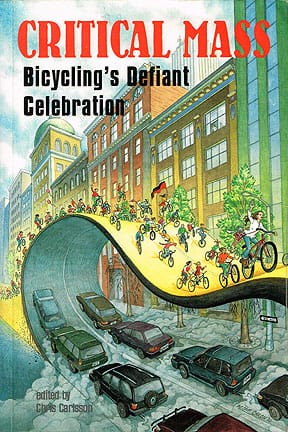
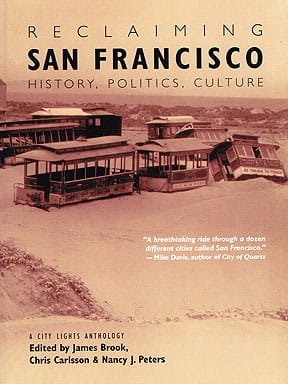
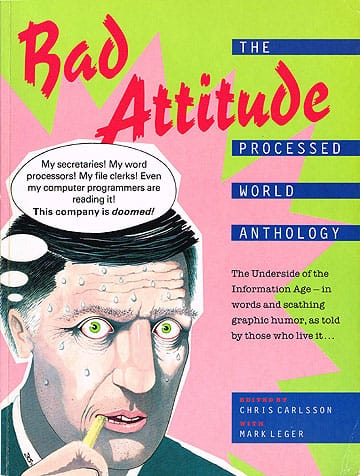

Wow, what a story – tremendous reportage.
My reactions to it, though, are not going to make the bells ring- we know this, all this stuff, all too well, and it will not be overturned.
I grew up, for example, in the college town of Amherst, Massachusetts. The home of the “Lord Jeffs.” The town could not have been more different than the projects that your gun-toting mugger came from. Yet the violence in that name of “Amherst” is fully in line with the violence of someone getting a camera by threatening a peaceful citizen with murder by a semi-automatic – “Lord Jeffrey Amherst” was a psychotic, fully depraved war criminal who explicitly advocated the genocide of the indigenous population, and who may have given them smallpox-laden blankets.
And he gets the name of the town, the college, the sports teams?